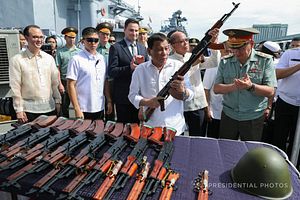Over the past week, suggestions have been made about a potential deal between Russia and the Philippines for Moscow to help Manila realize its long-held submarine dream. While the suggestions are more speculative than anything at this stage and are far from new, they have nonetheless once again highlighted the continued hype around the submarine capability for the Philippines under President Rodrigo Duterte and the possible range of partners Manila has as it embarks on its potential acquisition.
As I have noted before in these pages and elsewhere, the idea of the Philippines developing a submarine capability is not a new one and dates back to at least the 1990s, and, since then, the Philippine government has studied the issue and has in fact already taken some initial steps towards that long-term goal, including setting up a submarine office in 2013 and including it as a potential line item in its longer-term military modernization plans.
But the pursuit of a submarine capability has made headlines in recent months because of the possibility of it being moved up as a priority in the next few years while Duterte is in office (See: “Is the Philippines Moving Closer to Submarines Under Duterte?“). As the headlines have been generated, there has been speculation about the range of players that may be involved, with the submarine acquisition being tied to regular defense interactions between Manila and potential suppliers from South Korea to Russia. While Russia may not have been as much in the mix in traditional Philippine defense policy given its status as a U.S. treaty ally, Duterte’s tenure has seen an increased emphasis on cultivating both Moscow and Beijing as new security partners (See: “Where are Russia-Philippines Defense Ties Under Duterte?“).
Over the past week, another round of chatter has broken out regarding a potential submarine deal between Manila and Moscow. Following the July 29 meeting between Philippine Navy Flag Officer in Command Vice Admiral Robert Empedrad and Russian Navy Chief Admiral Vladimir Ivanovich Korolev in St. Petersburg during the Russia Navy Day celebrations, reports surfaced that submarine capabilities was discussed as an agenda item.
The reports stemmed primarily from comments made by Philippine Navy (PN) spokesman Jonathan Zata, who was quoted by the Philippines News Agency (PNA) on August 6 as saying that in discussing a draft memorandum of understanding for security cooperation between the two navies during the meeting, Korolev had made clear his commitment to supporting the PN in areas which included “the submarine acquisition project of the PN.” Those comments, coupled with the fact that the PN delegation was given the opportunity to visit Admiralty Shipyard where Russian submarines have been built, was enough to suggest that some kind of deal was in the offing.
The idea of Southeast Asian states turning to Russia for submarines is not new or particularly revolutionary – Vietnam, for instance, has done precisely that in recent years. But as is often the case with instances such as these, the notion of Russia supporting the Philippines’ submarine quest has taken off despite little clarity about what was actually said or discussed. While some accounts took this to mean that Russia may in fact provide the Philippines with submarines, Zata’s comments in fact did not clarify what Russian assistance in this respect would include, which could include just some knowledge sharing, ongoing discussions, or simply an intention of support from Moscow and an advertising of its own interest in helping meet Philippine defense needs rather than a formal, final, two-way agreement of some kind.
Furthermore, as we continue to see instances of such hype, it is also important to consider how this maps to what Philippine defense officials have publicly said about where Manila is on its submarine capabilities. As I have noted recently, officials have been careful to clarify that while the timeline for the submarine acquisition may be moved up, the Philippines is still currently conducting research and detailed studies about what its submarine program would look like and is not yet publicly announcing a preferred partner or set of partners as yet.
Of course, this is not to discount the possibility of some Philippine-Russia collaboration in certain areas, or to understate the progress both sides have made in some areas. Indeed, lost in the headlines focused on the submarine acquisition were other issues discussed by the two sides that are not without significance of their own, including on increasing naval visits and furthering cooperation in functional areas such as humanitarian assistance and disaster relief. These more seemingly mundane but nonetheless important components of defense collaboration will continue to be important to watch in the coming months, even though the more sensationalist ones may dominate the chatter.
































